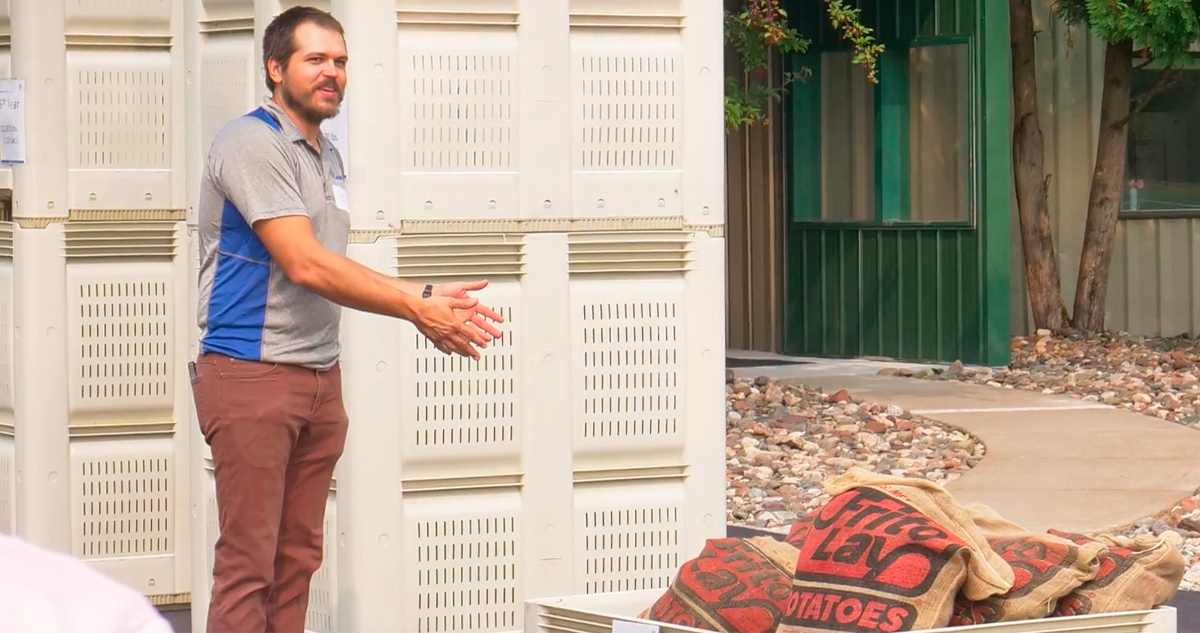“Harvest season has always been my absolute favorite time of year,” Josh Parsons says. He arrives before sunrise to walk through the fields at PepsiCo’s Rhinelander, Wisconsin, farm, filled with suspense about what’s beneath the soil. After a year of waiting, he’ll soon discover if his work is a success.
“The most exhilarating thing about potatoes is they grow underground,” Josh says. “You don’t know what you have until you dig them up.”
Josh, an R&D Sr. Principal Scientist, leads a team that cultivates never-before-seen varieties of potatoes destined to become the future of Lay’s potato chips. The annual harvest in Rhinelander yields bushels of new crops — and valuable information on the best ways to grow them.
There are more than 4,000 recognized potato varieties grown around the world, but fewer than 10 are the caliber for a Lay’s potato chip. Each one of those is proprietary to PepsiCo — carefully selected to maximize crop yield, disease resistance, nutrition content, cooking quality and taste. “But we’re always looking for better,” Josh says.

Josh at PepsiCo’s Rhinelander, Wisconsin, farm.
The techniques for discovering a new variety of potato combine traditional breeding with modern tools like data science and AI to select desirable plant traits. Josh and his team start with sets of “parent” potatoes, analyzing data to determine which would meet Lay’s standards for quality and sustainability. They add pollen from one plant to the flower of another to breed an entirely new seed with attributes from both parent plants — mimicking the same process that happens in nature.
“Each of those seeds is a unique individual, like siblings in a family,” Josh explains. Only instead of one or two offspring, each set of parent plants produce 200 to 400. Multiply that by dozens of cross-pollinations, and Josh’s team plants nearly 20,000 new seeds in Rhinelander each year. But only two or three of those seeds produce a potato variety that ever reaches a Frito-Lay kitchen.
“We’re incredibly selective,” Josh says. “We want to make sure the seeds we provide to growers benefit them, our business and the environment.” Josh and his team are also working to develop potato varieties that contain more flavor and need less seasoning — one way PepsiCo’s R&D and agriculture experts are innovating to support the company’s nutrition goals, which include a 15% sodium-reduction target for Lay’s Classic Potato Chips in the United States.
We want to make sure the seeds we provide to growers benefit them, our business and the environment.
To better predict future performance, the new potato breeds undergo complex statistical analysis of the seed’s genetics. “We don’t do any genetic modifications,” Josh says. “But we do use genetic information to forecast which crops have a chance to be successful and which don’t.”
Once Josh and his team have identified a successful crop, they send samples of the plant to partner farmers around the world so they can begin growing the new potatoes on their farms. The first variety Josh developed for PepsiCo was grown earlier this year and was recently cooked into a full batch of Lay’s — two key milestones in a development process that takes nine years to complete.
“I’m biased, but it was the best potato chip I ever tasted,” Josh says. There are still more hurdles the variety must clear before making it to store shelves but knowing that seedlings he bred could soon end up in Lay’s bags around the world instills a deep sense of pride.
“This job gives us a chance to leave a mark on an iconic brand,” Josh says. He keeps that thought at the forefront of his mind every day he goes to work. “Our team is small,” Josh explains. “But the work we do reaches farmers, kitchens, stores and consumers all over the world. It’s crucial that we act as owners, continuously seek ways we can improve and make sure the results of our efforts are felt far beyond the fields in Rhinelander.”